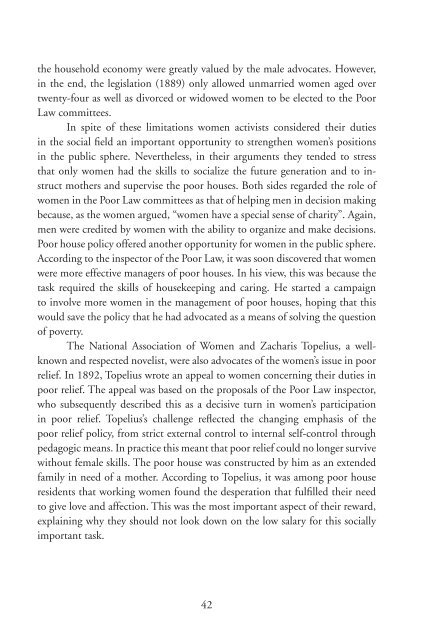Teaching Gender in Social Work - MailChimp
Teaching Gender in Social Work - MailChimp
Teaching Gender in Social Work - MailChimp
You also want an ePaper? Increase the reach of your titles
YUMPU automatically turns print PDFs into web optimized ePapers that Google loves.
the household economy were greatly valued by the male advocates. However,<br />
<strong>in</strong> the end, the legislation (1889) only allowed unmarried women aged over<br />
twenty-four as well as divorced or widowed women to be elected to the Poor<br />
Law committees.<br />
In spite of these limitations women activists considered their duties<br />
<strong>in</strong> the social field an important opportunity to strengthen women’s positions<br />
<strong>in</strong> the public sphere. Nevertheless, <strong>in</strong> their arguments they tended to stress<br />
that only women had the skills to socialize the future generation and to <strong>in</strong>struct<br />
mothers and supervise the poor houses. Both sides regarded the role of<br />
women <strong>in</strong> the Poor Law committees as that of help<strong>in</strong>g men <strong>in</strong> decision mak<strong>in</strong>g<br />
because, as the women argued, “women have a special sense of charity”. Aga<strong>in</strong>,<br />
men were credited by women with the ability to organize and make decisions.<br />
Poor house policy offered another opportunity for women <strong>in</strong> the public sphere.<br />
Accord<strong>in</strong>g to the <strong>in</strong>spector of the Poor Law, it was soon discovered that women<br />
were more effective managers of poor houses. In his view, this was because the<br />
task required the skills of housekeep<strong>in</strong>g and car<strong>in</strong>g. He started a campaign<br />
to <strong>in</strong>volve more women <strong>in</strong> the management of poor houses, hop<strong>in</strong>g that this<br />
would save the policy that he had advocated as a means of solv<strong>in</strong>g the question<br />
of poverty.<br />
The National Association of Women and Zacharis Topelius, a wellknown<br />
and respected novelist, were also advocates of the women’s issue <strong>in</strong> poor<br />
relief. In 1892, Topelius wrote an appeal to women concern<strong>in</strong>g their duties <strong>in</strong><br />
poor relief. The appeal was based on the proposals of the Poor Law <strong>in</strong>spector,<br />
who subsequently described this as a decisive turn <strong>in</strong> women’s participation<br />
<strong>in</strong> poor relief. Topelius’s challenge reflected the chang<strong>in</strong>g emphasis of the<br />
poor relief policy, from strict external control to <strong>in</strong>ternal self-control through<br />
pedagogic means. In practice this meant that poor relief could no longer survive<br />
without female skills. The poor house was constructed by him as an extended<br />
family <strong>in</strong> need of a mother. Accord<strong>in</strong>g to Topelius, it was among poor house<br />
residents that work<strong>in</strong>g women found the desperation that fulfilled their need<br />
to give love and affection. This was the most important aspect of their reward,<br />
expla<strong>in</strong><strong>in</strong>g why they should not look down on the low salary for this socially<br />
important task.<br />
42

















